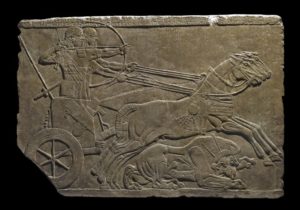Readers of the Bible may be shocked to discover that an important historical event is missing from its narrative. Most people have never heard of it, even though this event may have well changed the course of history. And more intriguing, it seems that the biblical authors and editors may have sought to suppress this event. Their reason, however, needs some exploration.
The Battle of Qarqar
In the mid 9th century BCE, the Assyrian Empire was rapidly conquering the ancient Near East. In 853 BCE king Shalmaneser III advanced with his army from Nineveh through modern-day Syria, capturing cities by fear or by force. If left unchecked, Shalmaneser III would turn south and quickly overrun every kingdom in his way. After sacking the city of Qarqar, the Assyrian forces finally met some resistance. A coalition of twelve kings gathered for war. Led by King Hadezer (Ben-Hadad II in the OT), the combined forces of the smaller kingdoms were able to halt the advance of Assyria. The annals of Shalmaneser III report an overwhelming victory, yet after such a supposedly “huge win,” Shalmaneser III returns home and does not go out to war for another 4 years.
While the Neo-Assyrian Empire would eventually gain control over the entire Levant and Egypt by the early 7th century, the coalition formed at Qarqar continued to be an effective resistance to the Assyrian expansion project in subsequent conflicts. Amongst the coalition force of 853 BCE, one name stands out for readers of the Old Testament: Ahab, King of Israel. He apparently sent 10,000 infantry and an impressive 2,000 chariots to aid the coalition. While Hadezer, who was in the most immediate danger of an Assyrian invasion provided 20,000 infantry, 1,200 horseman, and 1,200 chariots, Ahab had sent the second largest force and traveled a much longer distance than most of the coalition. Without him and his army, the coalition would have surely been defeated. ***
The Success of King Ahab

Gypsum wall panel depicting a lion hunt in relief: Source: British Museum
The extra-biblical events at Qarqar can shed light on the kingship of Ahab. The ability to aid his former enemy in their fight against Assyria shows both his forward-thinking, big-picture vision as well as his diplomacy skills. In addition, the ability to supply such a large force for the battle points to Ahab’s economic success. Most notably, Ahab brought 2,000 Chariots, rivaling the size of Assyria’s chariot force as well as the rest of the coalition’s. Chariots were an elite fighting unit which served as a mobile platform from which archers could fire into the enemy troops. They could transport other troops in and out of the battle, as well as chase down fleeing combatants. The issue with chariots is that they were expensive to build and maintain. While it’s impossible to determine an exact figure of what it would cost to maintain an army of this size, we can say with some certainty that the size of Ahab’s chariot force at Qarqar indicates a thriving Israelite economy.
If the Battle of Qarqar was such an important battle in the ancient Near East and one of Israel’s kings played a decisive role in its outcome, then why did the biblical authors choose to leave it out? This editorial move would be analogous to discussing the early 1940’s and not mentioning WWII – It just doesn’t make historical sense. Yet, some have suggested that the biblical authors did not want to include such a positive account of Ahab. Perhaps, this story wouldn’t fit their narrative that Ahab was Israel’s worst king. But is Ahab simply the target of an ancient version of the Fake News Media, or is there something else going on?
Fake News or Divine Disgust?
Perhaps the biblical authors choose not to include Ahab’s economic and military accomplishments because there was another value system in play. The narrative of Ahab’s reign as recorded in 1 Kings 16:29-22:53 is plagued by theological blunders on part of Ahab’s political and religious actions. Interestingly enough, in the very section where a scribe might have placed the events at Qarqar, we find a small story about one of Ahab’s political atrocities. 1 Kings 21, which can be placed as in and around the same period as the events of Qarqar, records how Ahab desires to expand his residential palace by purchasing the neighboring vineyard. However, Naboth, its owner, does not wish to sell his family’s inheritance. While Ahab sulks, his wife Jezebel devises a plan: They would set a trap, paying off some good-for-nothings to lie about him, in order to have him killed. Afterwards, the land would be theirs.
Ahab follows his wife’s plot and effectively has Naboth killed. Directed by God, Elijah confronts Ahab about his actions. Ahab “I have caught you because you devoted (lit. sold) yourself to do what is evil in the Lord’s sight” (1 Kings 21:20). From the perspective of world history, this scene is commonplace and inconsequential. So what if an ancient king assassinated a rival to steal his vineyard? What matters is how that king provided for and protected the rest of the country, right? Yet what matters to the biblical authors, what the real measurement of success is, is whether the king does what is right in the eyes of God.
While the historical account presumably bears witness to Ahab’s wealth and military genius, Scripture provides a theological perspective that overlooks these things, concentrating instead on Torah obedience. The fact that the battle of Qarqar is not included in the canon is perhaps telling of a deeper concern of the writer to reconfigure the value system by which to evaluate Israel’s monarchy. The success of Israel’s kingship is found in obedience to Torah and allegiance to Yahweh. In contrast, Ahab’s greed overflowed and he had a man killed in order to expand his power and wealth. Ahab may have been one of Israel’s most important kings economically and militarily speaking, but in the end, he is remembered as Israel’s worst king as he did not do what truly mattered. Over a century later, another prophet would warn of impending Assyrian invasion, indicting Israel for a similar disobedience. In the words of Micah,
He has told you, O man, what is good;
and what does the LORD require of you
but to do justice, and to love kindness,
and to walk humbly with your God? (Micah 6:8)
An Ancient Meaning for a Modern Context
Even though this text is ancient, how might it speak anew for today? I don’t want to press the similarities too far, but there seems to be an unnerving number of parallels with this ancient account and today’s political climate. I have been noticing a number of Christians (and pastors) making excuses for the President’s less than appropriate behavior by citing his so-called economic success. Obviously, the economy is important, but I don’t believe that it can be the proper tool by which Christians gauge the virtue or success of anything. Is the economy more important than children in cages, or childish bullying of people and minorities, or the staggering denial of the deaths of 3,000 people in Hurricane Maria which struck Puerto Rico? The answer is no; our evaluations must be according to the proper measurement. Success does not equal a booming economy, more money in the bank, more people in the pews, or more of anything. These are not virtues. Success, in the Christian sense, is evaluated by how one relates to God and how one obeys his commandments which have been embodied in the example of Jesus Christ.
If you want to know how to evaluate a leader, a government, or a company, don’t look at the stock market or the economy, or foreign diplomacy – look at how they reached these achievements. Are there any Naboths? Have people been sacrificed to the pursuit of success? If there are, then the church must reclaim its prophetic voice, and like Elijah, we must confront the perpetrators of injustice. To stand by in silence is to forget our identity in Christ and our calling to image him to a broken world.
Finally, this doesn’t just apply to the President, the Republicans, or to the Democrats; Scripture also challenges us. So often we can find ourselves succeeding in some things but failing in the more important areas. Our work can be an important mission field, but it can quickly turn into a minefield when we begin to prioritize our relationships and responsibilities there over and against our family. Church ministry and one-way relationships can also become something that distracts you from your truer calling. Deciding what is important to God’s purpose for your life is really difficult sometimes, but fortunately, God has given us an example in his Son and empowers us through his Spirit.
*** Discussion about Qarqar, ancient Near Eastern warfare, chronology, and the accuracy of military numbers are complex. For more information see the following:
M. Elat, “The Campaigns of Shalmaneser III against Aram and Israel.” Israel Exploration Journal 25, no. 1 (1975): 25-35. http://www.jstor.org/stable/27925486.
W. Hallo, “From Qarqar to Carchemish: Assyria and Israel in the Light of New Discoveries,” The Biblical Archeologist 23 (1960): 33-61.
Boyd Seevers, Warfare in the Old Testament: the Organization, Weapons, and Tactics of Ancient Near Eastern Armies. Grand Rapids, MI: Kregel Academic, 2013.
William H. Shea, “Biblical Archeology”, Ministry Magazine. May 1979. https://www.ministrymagazine.org/archive/1979/05/biblical-archeology
Charlie Trimm, Resources for Biblical Study. Vol. 88, Fighting for the King and the Gods: a Survey of Warfare in the Ancient Near East. Atlanta: SBL Press, 2017.





1 Comment
Leave your reply.